What Is Contextual Link Building for SEO?
Dec 15, 2023
Written by Casey Bjorkdahl

Casey Bjorkdahl is one of the pioneering thought leaders in the SEO community. In 2010, Casey co-founded Vazoola after working for a Digital Marketing Agency for five years in New York City. Vazoola is now one of the fastest growing and most widely recognized SEO marketing firms in the country.
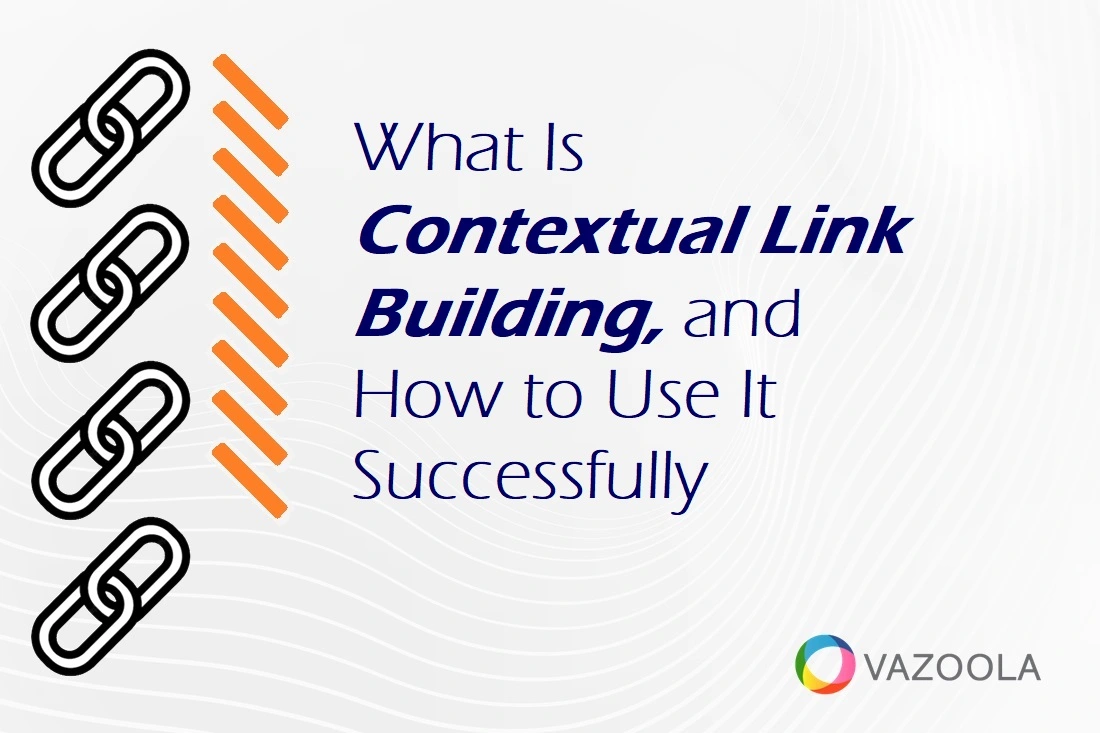
Did you know that a single, well-placed contextual inbound link is potentially more powerful than a dozen random backlinks?
In the vast universe of search engine optimization, contextual links are the hidden stars, quietly but significantly shining light on a site's authority and elevating its search ranking to new heights.
At Vazoola, we recognize the significant impact of contextual links in SEO.
Contextual links are not just typical hyperlinks; they are thoughtfully embedded within a website's content.
Their strategic placement is essential, as it ensures the links are relevant to the surrounding text, enhancing the overall user experience.
SEO used to be about focusing on one link building strategy that scales.
— Venchito 📈 SaaS & Ecommerce Link Building (SEO) (@venchito14) November 1, 2023
Now, it's all about diversifying link types and building foundational links before moving to contextual link building.
Link acquisition progresses like any other industry.
Through our extensive experience, we've learned that contextual links are much more than mere connections between webpages.
They serve as indicators of your particular website content's quality and relevance, signaling to Google and other search engines that your site is a valuable source of information. This understanding forms the basis of our approach to on-page SEO.
By incorporating contextual links naturally within high-quality, relevant content, we've seen a notable increase in website authority.
The improvement often leads to enhanced rankings in search engine results pages, attracting more organic traffic to the site.
The premise of our contextual link building guide is rooted in the belief that these links are a major ranking factor, providing a significant boost to a website's credibility and visibility.
Key Takeaways:
-
Contextual links are backlinks placed within content that is relevant to the linked page, making them a significant factor in search results. They differ from other types of links due to their relevance and strategic placement, contributing to increased website authority and higher search rankings.
-
Contextual backlinks are vital for improving user experience, attracting a relevant audience, and increasing the value of links, especially since the Penguin update. They play a crucial role in how efficiently search engines understand and value links, and they aid in building meaningful relationships within specific niches.
-
Contextual link building involves strategies like creating high-quality content, engaging in broken link building, guest blogging, reaching out to content curators, conducting interviews, and utilizing professional SEO services.
-
Best practices for building contextual links include focusing on the surrounding text more than the anchor text and utilizing methods like niche edits, guest posts, and HARO for acquiring links. Quality should be prioritized over quantity and effective outreach and relationship building are key.
Table of Contents
What Are Contextual Links?
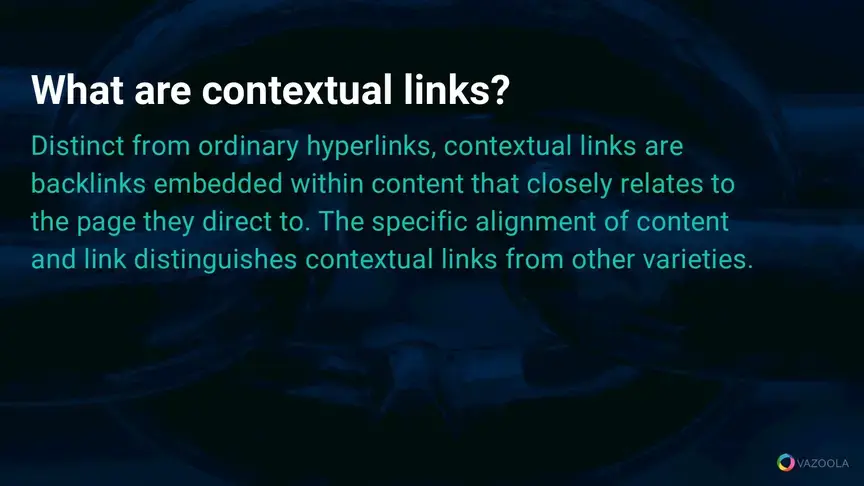
Contextual links are a vital element of effective SEO. At Vazoola, we have focused on harnessing the power of these links to bolster digital marketing strategies.
Distinct from ordinary hyperlinks, contextual links are backlinks embedded within content that closely relates to the page they direct to. The specific alignment of content and link distinguishes contextual links from other varieties.
The Role of Contextual Links in SEO
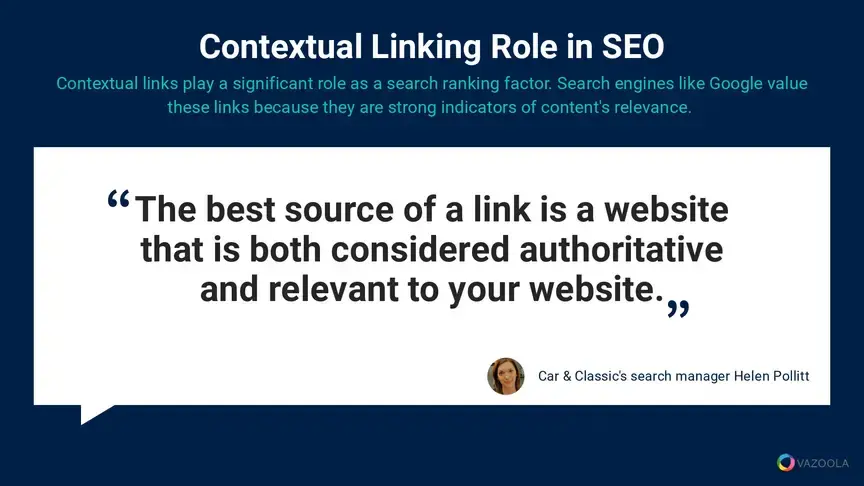
Contextual links play a significant role as a search ranking factor. Search engines like Google value these links because they are strong indicators of content's relevance.
When a contextual link is appropriately placed within pertinent, high-quality content, it sends a powerful signal to search engines, suggesting the value and rank-worthiness of your content.
The Power of Contextual Links
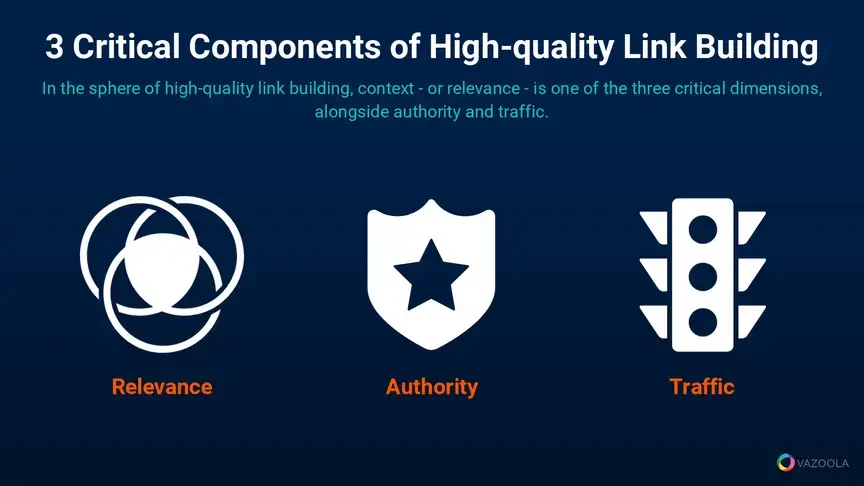
In the sphere of high-quality link building, context - or relevance - is one of the three critical dimensions, alongside authority and traffic.
The power of a contextual link derives not only from the authority of the linking site but also from its relevance to the content it links to. That relevance amplifies the effectiveness of contextual links in enhancing a website's SEO.
Contextual links also play a crucial role in increasing web authority. Our experience at Vazoola has shown that these links significantly contribute to establishing a website's reputation and credibility.
Links from other relevant websites and authoritative sources elevate your website's perceived value, making it more appealing to both users and search engines.
Results of Contextual Links
Improved rankings in search engine results pages are direct results of strategic contextual linking.
Focusing on creating and obtaining high-quality contextual links can lead to noticeable advancements in search rankings for your particular web page.
The improvement can be attributed to search engines recognizing the relevance and authority conveyed by these specialized links.
Contextual Links Vs Other Links
Contextual links differ from other types of links primarily in their placement and relevance.
While other links might be randomly placed or found in less relevant sections of a website, contextual links are carefully integrated into content that directly relates to the target website.
That relevance not only enhances the user experience but also strengthens the link's impact on SEO.
Contextual Linking Profile
The correlation between contextual linking and domain authority, which is largely determined by a website's backlink profile, is significant.
A robust profile enriched with high-quality contextual links signals to search engines that your own website is a reliable and authoritative source in your field. This combination leads to higher domain authority and, consequently, improved SEO performance.
Our recommendation: We advocate for the strategic use of contextual links in your strategy for building links. Their unique ability to enhance website authority, improve rankings, and build a strong backlink profile makes them an indispensable tool in achieving link building SEO success.
Pro Tips:
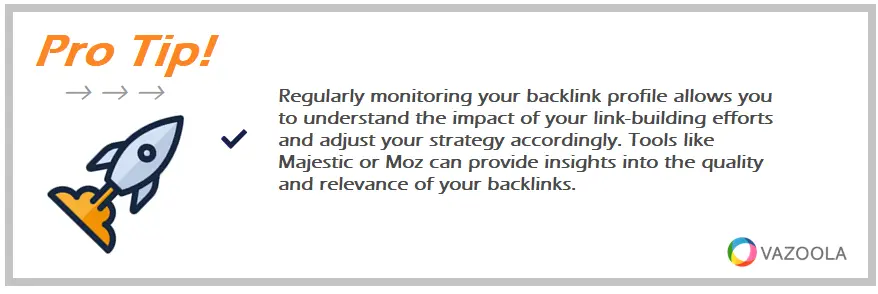
Regularly monitoring your backlink profile allows you to understand the impact of your link-building efforts and adjust your strategy accordingly. Tools like Majestic or Moz can provide insights into the quality and relevance of your backlinks.
Types of Contextual Links
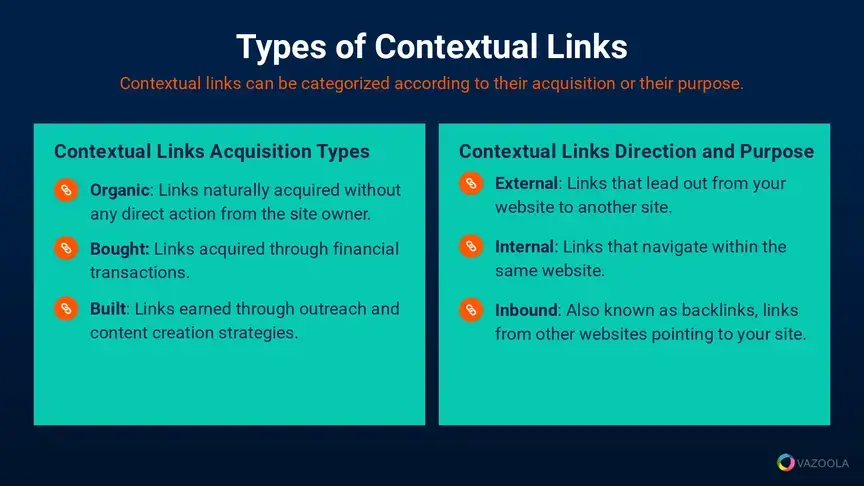
Contextual links, a key element in SEO link building strategies, can be categorized based on their origin or their navigational purpose.
Understanding these categories is crucial for effectively utilizing contextual links in digital marketing.
The origin of a contextual link refers to how it is acquired, while its navigation pertains to where the links pointing to.
Both aspects are vital in determining the link's effectiveness and its impact on SEO.
Contextual Link Acquisition Methods
Contextual links can originate in various ways, each with its unique characteristics and benefits. These origins can be broadly classified into three categories:
-
Organic: Organic contextual links are those that are naturally acquired without any direct action from the site owner.
These links are typically the result of high-quality content that other site owners or content creators find valuable enough to link to.
For example, a well-researched article or an informative blog post might naturally attract links from other websites in the same niche.
-
Bought: Bought contextual links are acquired through financial transactions. This can involve paid links associated a guest post, sponsored content, or direct link insertions.
While this method can be effective, it's important to adhere to search engine guidelines to avoid penalties.
A bought link, for example, might be a sponsored article on a popular blog that includes a link back to your website.
-
Built: Built contextual links are those that you actively seek out through outreach and content creation strategies.
This might involve reaching out to bloggers for guest posting opportunities or creating valuable resources that others are likely to link to. It also includes reciprocal links acquired by linking to a relevant website and receiving a contextual backlink in return.
For instance, creating an in-depth guide and sharing it with industry influencers could result in them linking back to your guide.
Contextual Link Navigation Direction
The navigational direction of a contextual link is another critical aspect to consider. This type of contextual link can be categorized in the following ways:x
-
External Links: Contextual external links are those that lead out from your website to another site.
These outgoing links are important for providing your audience with additional resources and for establishing connections with other websites.
For example, linking to a relevant study, article or other relevant links from your blog post would be considered an external link.
-
Internal Links: Internal contextual links are links that navigate within the same website.
They are crucial for improving user experience and site navigation, as well as for passing link juice throughout your site.
An example of an internal link might be linking from one of your blog posts to amore actual content on your website.
-
Inbound Links: An inbound contextual link, also known as a contextual backlink, is a link from other websites pointing to your site.
These are extremely valuable for SEO, as they act as endorsements of your content's quality.
An example of an inbound link might be a link from an industry news site to a product page on your website. It also includes reciprocal links exchanged between websites in relevant niches.
Why are Contextual Backlinks Important?
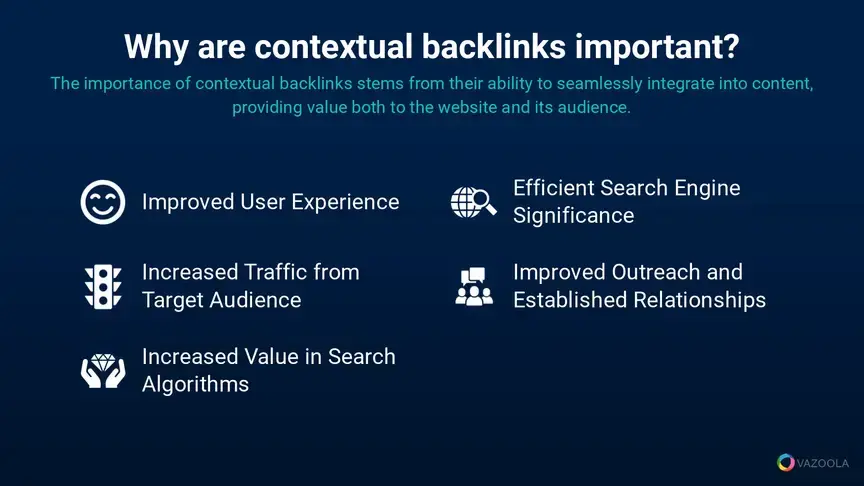
Quality contextual backlinks are a cornerstone in the architecture of effective SEO link building strategies.
At Vazoola, we've seen firsthand how these links not only enhance a site's performance in search engine rankings but also contribute to a more holistic and effective online presence.
The importance of contextual backlinks stems from their ability to seamlessly integrate into content, providing value both to the website and its audience.
Keep reading our contextual link building guide as we explore various benefits of the strategy, including:
-
Improved User Experience: Contextual backlinks significantly enhance the user experience by providing relevant and valuable information.
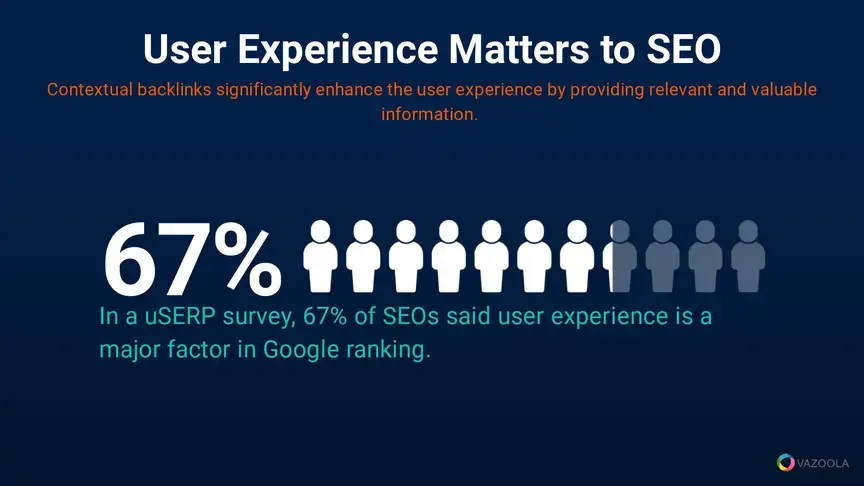
-
In a uSERP survey, 67% of SEOs said user experience is a major factor in Google ranking, emphasizing the importance of contextual links that improve user experience.
It's simple: When readers find links that seamlessly connect to helpful and related content, their engagement with the site increases.
The boosted engagement not only keeps site visitors on your site longer but also helps establish your site as a reliable resource in your niche.
-
Increased Relevant Traffic: A well-implemented contextual link-building strategy drives traffic from audiences that are genuinely interested in your content.
The visitors are more likely to engage with your site, as the links they followed were relevant to their interests.
Engaged traffic is not just about numbers; it's about attracting a target audience more likely to convert into customers or followers.
-
Increased Link Juice: Since Google's Penguin update, the value of contextual links has soared.
The update made it clear that not all links are created equal, with a preference for those placed in relevant content.
Contextual links are now more valuable than ever, as they are considered more trustworthy and relevant, directly contributing to a site's search engine ranking.
-
Efficienct Search Engine Recognition: Contextual links are efficient in conveying the significance of the link to search engines like Google.
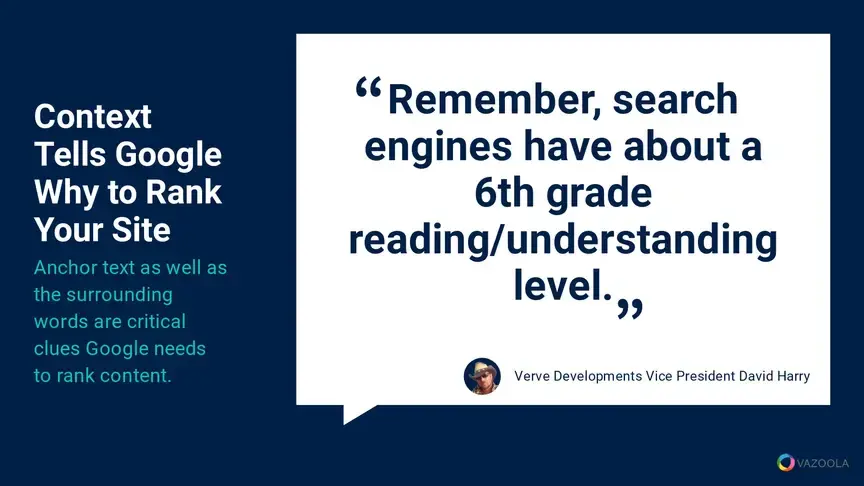
-
When a link is surrounded by relevant content, it's easier for search engines to understand its context and relevance.
That clarity helps in accurately assessing the link's value, which can positively impact your site's SEO performance.
-
Improved Networking and Outreach: The process of contextual link building often involves outreach, which can lead to valuable networking opportunities with high quality sites sharing the same user base.
By reaching out to high quality websites in your niche for link-building, you not only gain quality backlinks but also build relationships within your industry.
These connections can lead to further collaboration, guest posting opportunities, and a stronger presence within your niche.
Pro Tips:
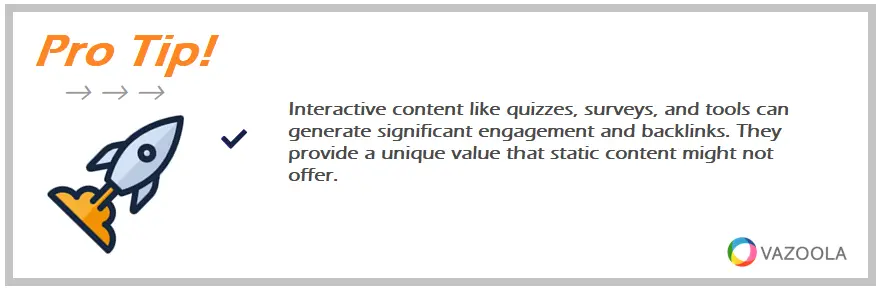
Interactive content like quizzes, surveys, and tools can generate significant engagement and backlinks. They provide a unique value that static content might not offer.
How to Build Contextual Links
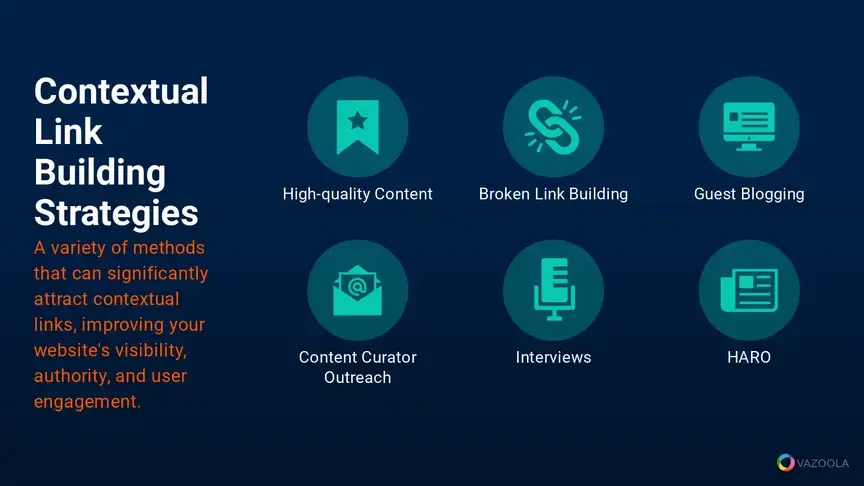
Contextual link building is a vital strategy in enhancing a website's SEO performance.
At Vazoola, we understand the significance of these links and advocate for a variety of methods to effectively integrate them into your digital marketing strategy. We also make it easy to buy contextual links from high quality sources. Its common to wonder if contextual links are safe, and they are when secured from the right sources.
Each approach, when executed correctly, can significantly improve your website's visibility, authority, and user engagement.
High-Quality Content Creation
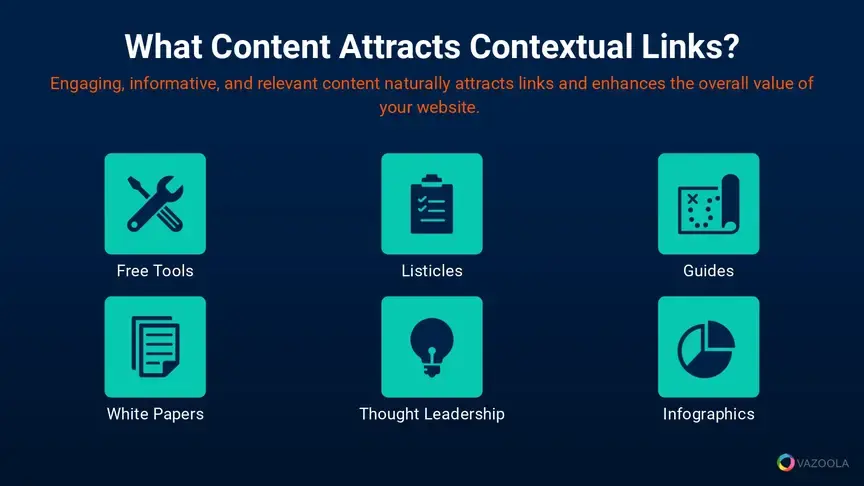
High-quality content creation is at the core of successful contextual link building.
Engaging, informative, and relevant content naturally attracts links and enhances the overall value of your website.
According to a Content Marketing Institute survey, 81% of content marketers attribute their success to content creation, highlighting the importance of high-quality content in attracting links.
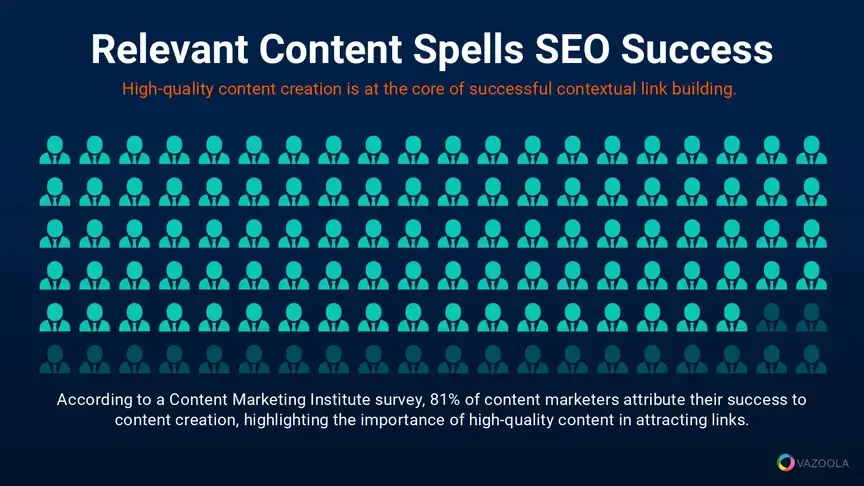
The following are just a few examples of content that can effectively attract contextual links:
-
Free Tools: Tools that offer practical value can attract links from users and websites that find them beneficial. For instance, a free SEO audit tool on your site can attract links from marketing blogs.
-
Listicles: These provide concise, valuable information and are often linked due to their user-friendly format. A well-researched listicle on 'Top SEO Trends' can become a go-to resource.
-
Guides: Comprehensive guides offer in-depth information on specific topics, making them highly linkable. An authoritative guide on content marketing strategies, for example, can attract links from other authoritative websites in the marketing niche.
-
White Papers: Detailed reports on specific topics showcase expertise and attract links from academic and professional sources. A white paper on the future of digital advertising, for instance, can be a valuable resource in your niche.
-
Thought Leadership Articles: Content that demonstrates thought leadership establishes authority and encourages others to link to your insights. Articles on innovative topics in your field can position you as a leader.
-
Infographics: Visually appealing and informative, infographics simplify complex information, making them highly shareable and link-worthy. An infographic on social media statistics, for examples, can be widely shared and linked to.
Pro Tips:
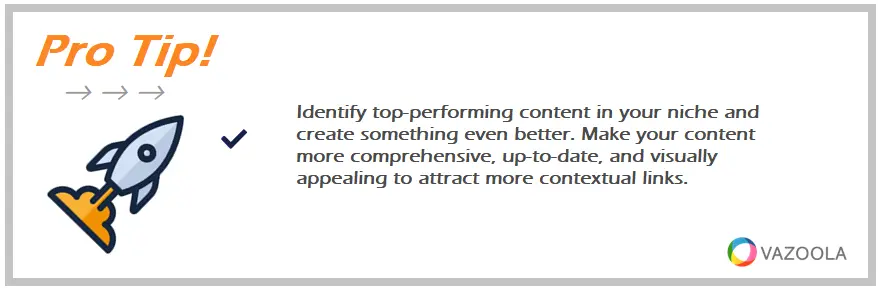
Identify top-performing content in your niche and create something even better. Make your content more comprehensive, up-to-date, and visually appealing to attract more contextual links.
Broken Link Building
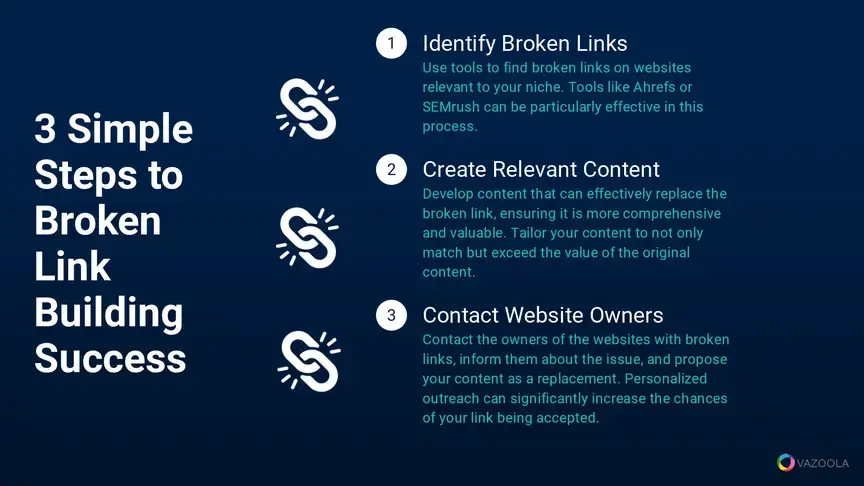
Broken link building is a strategic approach to acquiring contextual links by identifying and replacing broken links on other websites with your content.
This broken link method involves is a simple link building tactic, involving just a few steps:
-
Identify Broken Links: Use tools to find broken links on websites relevant to your niche. Tools like Ahrefs or SEMrush can be particularly effective in this process.
-
Create Relevant Content: Develop content that can effectively replace the broken link, ensuring it is more comprehensive and valuable. Tailor your content to not only match but exceed the value of the original content.
-
Reach Out to Website Owners: Contact the owners of the websites with broken links, inform them about the issue, and propose your content as a replacement. Personalized outreach can significantly increase the chances of your link being accepted. In fact, HubSpot reports that personalized emails improve click-through rates by 14% and conversion rates by 10%.
Pro Tips:
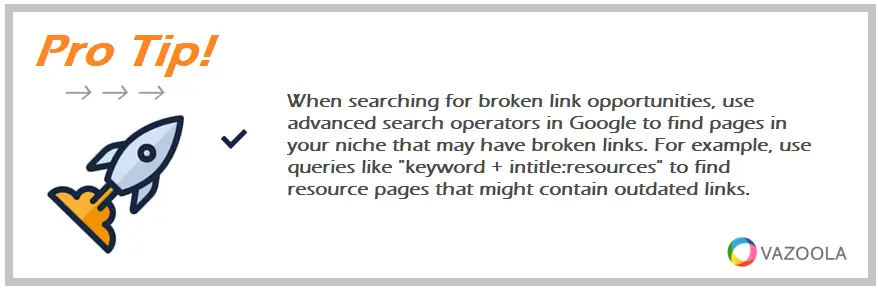
When searching for broken link opportunities, use advanced search operators in Google to find pages in your niche that may have broken links. For example, use queries like "keyword + intitle:resources" to find resource pages that might contain outdated links.
Guest Blogging
Guest blogging is a powerful contextual link building strategy.
It involves writing and publishing articles on other websites in your niche.
When guest blogging, it's important to create content that is both relevant to the host site's audience and valuable in its own right.
Including a contextual link back to your site within this content can drive relevant traffic and enhance your site's authority.
Our recommendation: Build relationships with blog site owners and regularly contribute to establish yourself as a trusted figure in your industry.
Content Curator Outreach
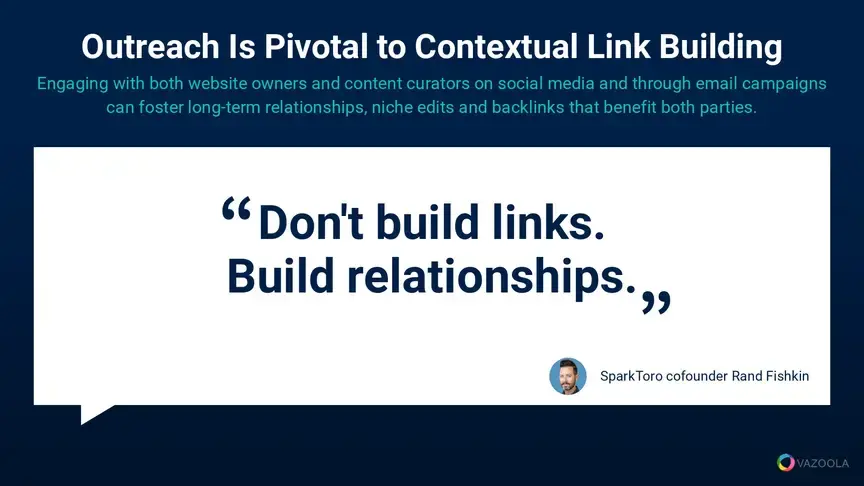
Content curator outreach focuses on connecting with individuals who specialize in gathering and sharing content within a specific niche.
By reaching out to these curators and presenting your content as a valuable addition to their collections, you can gain contextual links that enhance your website's visibility and credibility.
Engaging with these curators on social media and through email campaigns can foster long-term relationships and niche edits that benefit both parties.
Pro Tips:
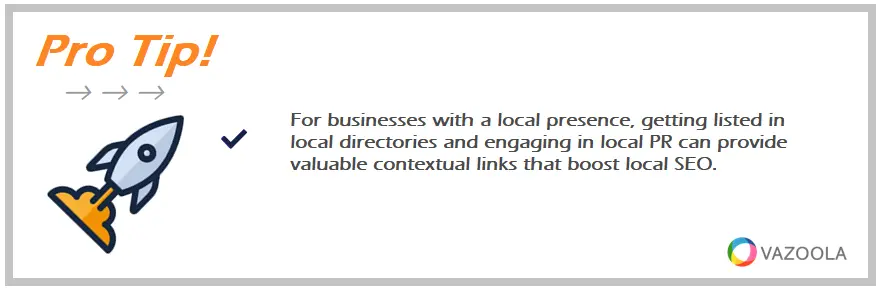
For businesses with a local presence, getting listed in local directories and engaging in local PR can provide valuable contextual links that boost local SEO.
Interviews
Engaging in interviews, whether by conducting them with industry figures or being interviewed by others, is an excellent way to build contextual links.
These interactions provide opportunities to share expertise and insights, and they often result in backlinks from a variety of sources, further enhancing your website's authority.
Interviews - whether on podcasts, social media or another digital format - not only provide backlink opportunities but also increase your exposure and position you as an expert in your field.
Pro Tips:
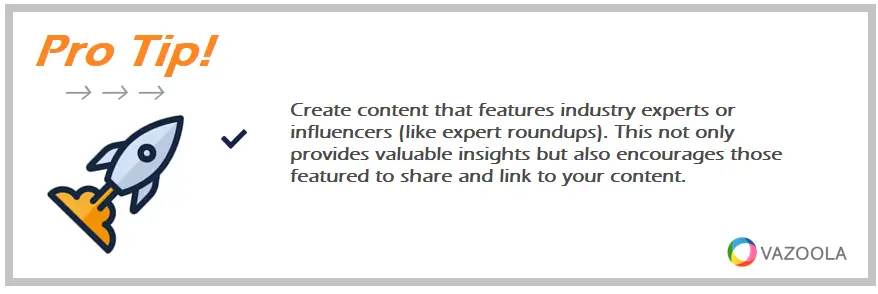
Create content that features industry experts or influencers (like expert roundups). This not only provides valuable insights but also encourages those featured to share and link to your content.
HARO
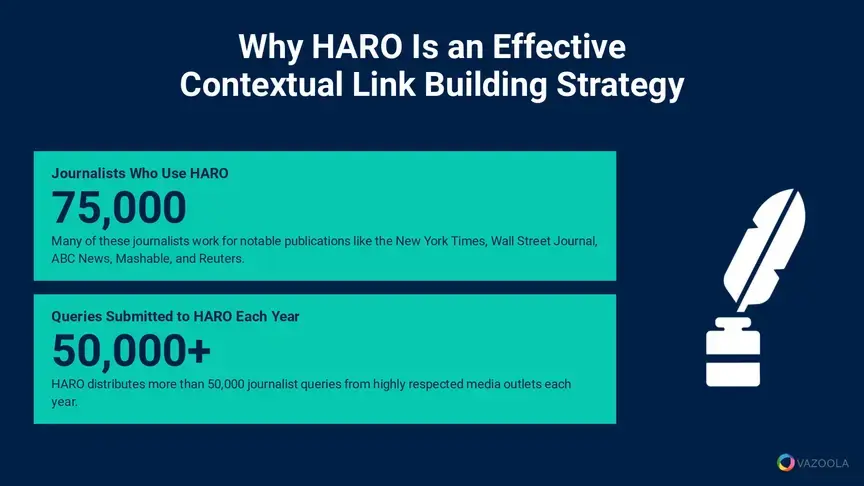
HARO, or Help a Reporter Out, connects journalists and content creators with industry experts and sources, offering a mutually beneficial relationship.
More than 75,000 journalists use HARO to submit 50,000+ queries a year. Even more impressive, many of these journalists work for notable publications like the New York Times, Wall Street Journal, ABC News, Mashable, and Reuters.
By responding to queries from journalists on HARO, you can provide valuable insights or information for their articles.
In return, you often receive a mention or a link back to your website. This method not only helps in building high-quality, authoritative backlinks but also positions you or your company as a thought leader in your industry.
Best Practices for Contextual Link Building
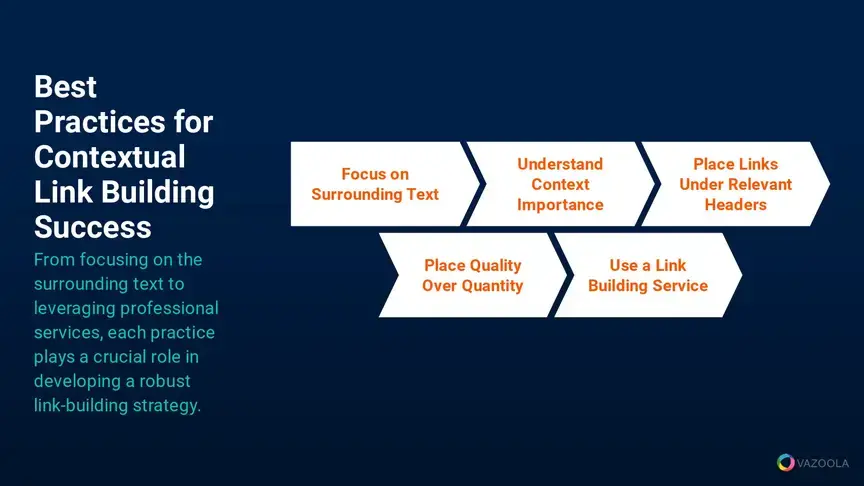
Contextual link building is a nuanced and strategic aspect of SEO that requires careful consideration and execution.
The best practices in our contextual link building guide are not just about placing links; they are about understanding the broader context in which these links exist and ensuring they add value to both your content and the user experience.
From focusing on the surrounding text to leveraging professional services, each practice plays a crucial role in developing a robust link-building strategy.
Focus on Surrounding Text
The surrounding text of a link often holds more significance than the anchor text itself.
It's still essential to use anchor text that is relevant and accurately describes what the user will find by clicking on the link. However, the context in which this anchor sits is equally important.
Google's sophisticated algorithms are adept at understanding the content and context surrounding a link, including the primary keyword and descriptive phrases, making it crucial to ensure that this context is relevant and adds value to the linked content.
Understand Content and Context
Google's advanced understanding of content and context has made it imperative to consider these elements in your link-building strategy.
Contextual links should be placed in content that is not only relevant to the linked page but also adds to the overall narrative of your content.
Such relevance is key to ensuring that your links are seen as valuable by search engines and users alike
Place Links Under Relevant Headers
Placing backlinks under headers that are highly relevant to the page the link is going to can significantly enhance the link's effectiveness.
The practice ensures that the link is seen as part of a larger, cohesive piece of content, thereby increasing its relevance and value both to users and search engines.
Focus on Quality Over Quantity
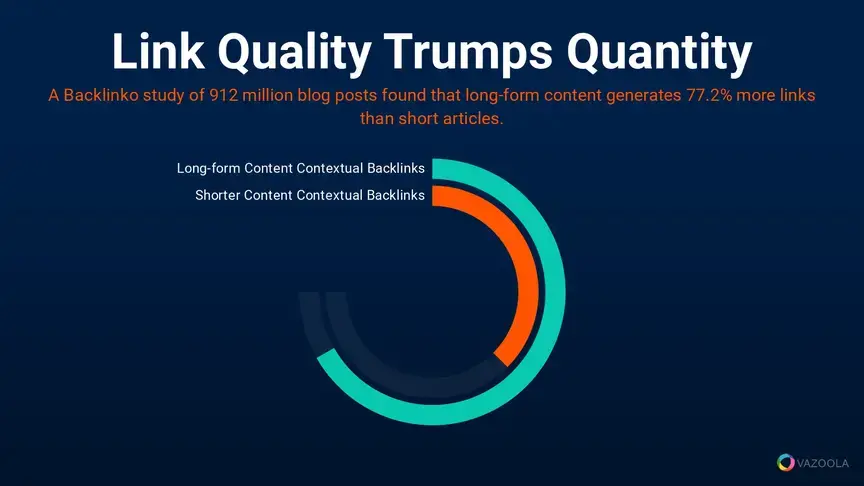
In contextual link building, inbound link quality always trumps backlink quantity.
It's better to have fewer high-quality, well-placed links than a multitude of poorly integrated ones.
A Backlinko study of 912 million blog posts found that long-form written content generates 77.2% more links than short articles, suggesting that quality and comprehensiveness are key in link acquisition.
Our recommendation: Focus on acquiring links from reputable, high-authority sites and ensure that each link adds real value to your content. Even if you don't get as many links, they'll pass more link juice to your site.
Utilize Link Building Services
For those who need assistance with contextual link building, professional link-building services can be invaluable.
These services have the expertise, resources, and networks to effectively implement a contextual link-building strategy.
They can help identify opportunities, craft outreach strategies, and ensure that your links are placed in the most beneficial contexts.
Remember, while link building can provide a significant boost to your website's search ranking, if not strategically executed, non-contextual links can do more harm than good.
Pro Tips:
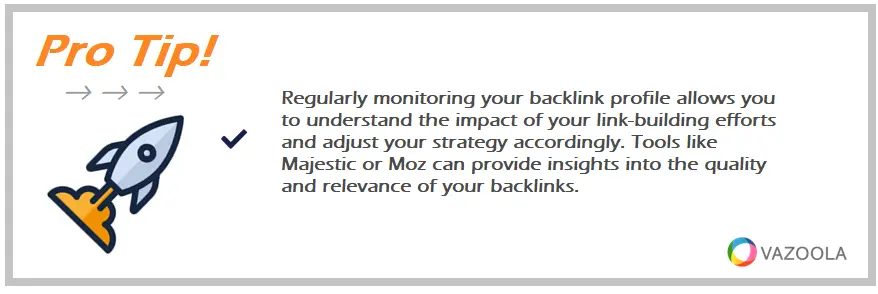
Regularly monitoring your backlink profile allows you to understand the impact of your link-building efforts and adjust your strategy accordingly. Tools like Majestic or Moz can provide insights into the quality and relevance of your backlinks.

